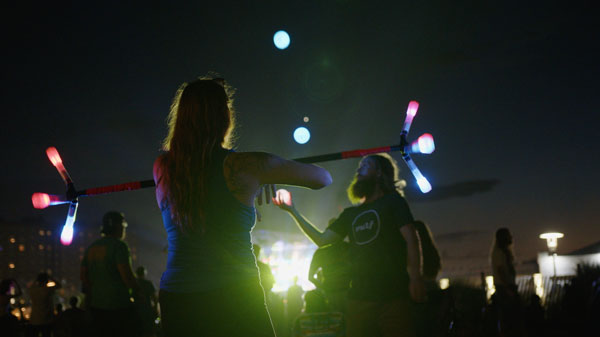
Still from The Sprayer
Balaena directed by Alessia Cecchet and The Sprayer directed by Farnoosh Abedi are two short films playing at the 2023 New Jersey International Film Festival that address the relationship between people and their impact on the environment, both negative and positive. These films use various art forms to highlight the issue of climate change in a thoughtful and visually stimulating way.
Opening and closing on a shot of a dead whale stranded on a beach, Balaena illustrates the cyclical pattern of life and death in ecosystems, but delves into the roles humans take in accelerating this process for living creatures. During the title card, the sound of a bell tolls, an audio sign that the creature we are viewing has died. Yet the way people respond begs the question: does anyone care? Throughout the film there is a juxtaposition between two locations - one, the beach, being a representation of a natural habitat, and the other being structures from the constructed man-made world. In one scene, a dead animal lays in the middle of a parking garage with individuals merely standing near it, staring. The long shot of this interaction illustrates how unless the animals being harmfully impacted by environmental damage are in front of our faces, humans will not pay attention. And even when these injured animals are in front of our faces, we often do not do anything. Further, it comments on the idea that humans rarely interact with wildlife and nature - a part of our world we are killing - because we as people live isolated in our own industrial cage. The director also utilizes multiple fade transitions, symbolizing how our flora and fauna are fading from our lives, due to humans' malevolent impact. However, a fade transition involves an overlap of two different shots, possibly signifying how the man-made world and natural world are intertwined and affect each other. They are in fact not separate, but one and the same. While Balaena deals with the consequences of climate change on ecosystems, it also remarks on the modern infatuation with and addiction to spectacle. The film shows tourists taking photos of the dead whale lying on the beach, rather than acting or changing their ways. Similarly, scientists dealing with the whale stop their proceedings to take a group selfie. In doing so, the director critiques humans' preference for an interesting photo instead of recognizing and making reparations for mankind’s detrimental footprint.
Still from Balaena
The Sprayer also plays with the problem of climate change, but if Balaena handles negative human involvement, The Sprayer considers the opposite. In a dystopian future somewhat resembling the warscapes from WWII, the film takes on the concept of a twisted ecoterrosim. In this post-apocalyptic world, robotic soldiers spray and kill any sign of biological life, raiding and destroying civilization to achieve a world devoid of flora. Yet hidden behind outfits resembling the spray-soldiers, there is a group of humans fighting to keep plants and information alive. As one soldier finds a child of the opposition secretly growing a sapling, a plant being something the soldier has never seen, this sprayer begins to change their ways. When the child and plant’s life become threatened, the sprayer revolts against the commander and protects the living beings, allowing a successful escape. Although it is set in a future dystopian world, the mutinous sprayer is seen reading Fahrenheit 451, a reminder that this fictional world could eventually be our own if we are not careful. The rebellion of plant protectors and small reminders of biological growth through cracks in concrete displays the defiance and resistance of a powerful wildlife fighting against human destruction. In this way, The Sprayer promotes the fact that if humans change their ways rather than ignore the problem, there can be revolutionary change. It is humans who need to change, instead of expecting the world to.
Both films incorporate various kinds of media to convey their message, including embroidery, etchings, animation, stop-motion, rendering, and more. Just as this myriad of art forms reminds the audience members of the possible beauty humans can create, these films inspire the spectator to reflect on their own environmental impact and make a change for the better.
Balaena & The Sprayer screen at the 2023 New Jersey International Film Festival on Sunday, June 4. The film will be Online for 24 Hours and In-Person at 5 PM in Voorhees Hall #105/Rutgers University, 71 Hamilton Street, New Brunswick, NJ. Tickets are available for purchase here.










